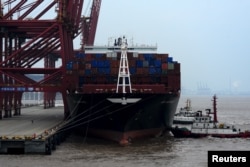China’s economic slowdown has resulted in government agencies protecting domestic companies by throwing more hurdles at foreign investors, according to a survey by the American Chamber of Commerce in China.
Reporting the results of the survey of its member companies, the business organization said, "For the first time in five years, member companies cited “inconsistent regulatory interpretation and unclear laws” as the top business challenge". It added, “Obtaining required licenses” returned to the list of top five business challenges.
“Implementation of the recently enacted security regulations has emerged as a serious bottleneck for foreign companies. Investors who deal with government agencies are confronted by a lack of transparency and excessive discretion in the enforcement of regulations,” it said.
“Serious and systemic challenges remain, particularly around the key issues of market access and barriers to investment, opaque rules and regulatory practices, and the overall development of and respect for the rule of law,” AmCham China Chairman James Zimmerman said while releasing the white paper in Beijing on Friday.
Foreign investment in China would be lower this year compared to 2015 because of a slowing economy, higher labor costs and market access barriers, the report said. Two other concerns are an uncertain policy environment and difficulties in competing with local companies.
Multinationals losing importance
"Somehow, the privileged position of multinationals in China has been reduced from what it was before," said Scott Kennedy, deputy director of the Freeman Chair in China Studies at the Washington based Center for Strategic and International Studies. "The challenges that multinationals face are not simply rule implementation at the local level but reflect national government policies as well.”
Liu Qiao, associate dean at the Guanghua School of Management at Peking University, took a different view.
"I would say this is some of the turbulence that you see in most of the emerging economies. It is not always a smooth ride. Sometimes due to political considerations, there are ups and downs," he told VOA. "But I would say there is no reason for China to reverse its reforms process.”
Working at loggerheads
The official machinery is often seen working at cross-purposes from Premier Li Keqiang's drive to rewire the industrial economy with higher levels of innovation and technology upgrades. There is little effort to involve foreign companies, which have traditionally provided technology and management expertise to the domestic industry, AmCham said.
Because of this, according to the report, a majority of technology intensive foreign firms that are engaged in research and development have decided to slow their China investment plans in 2016.
"More than 80 percent of companies who decreased their investment due to ‘market access barriers or government policies that disadvantage foreign companies in your sector' were services and technology and other R&D [research and development] intensive companies," the White Paper said.
It added that there was still "distrust of foreign technologies and governments" in China, with an increase in protectionist tendencies and a higher reliance on indigenous technology.
Major Chinese companies have been buying up industrial and commercial assets around the world. Instead of worrying about Chinese outbound investments, nearly 70 percent of American companies see that action as an opportunity to collaborate and expand business.
A high 81 percent of the U.S. companies said they saw China's consumer sector as a major growth area because of the increasingly large and affluent middle class.







